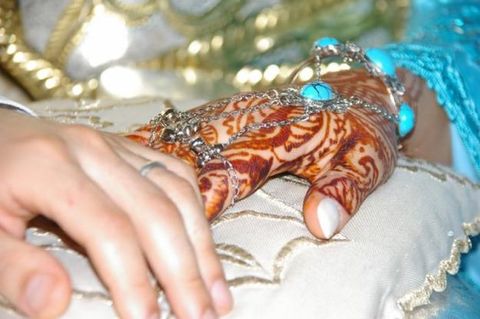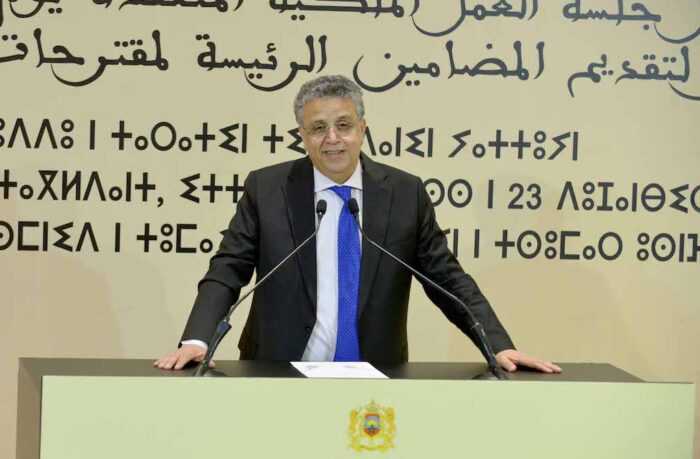Until now, engagement had no contractual value under Moroccan law. But the new Moudawana will remedy this. This was announced by the Minister of Justice, Abdellatif Ouahbi, on December 24, when he announced the main proposals adopted for this reform. From now on, there will be the « possibility of recording the engagement » between a woman and a man, he announced.
What does this mean? « Currently, engagement is not formally recognized in the Moroccan Family Code. By recording the engagement, we give it legal recognition, which can clarify the rights and obligations of the parties prior to marriage », explains Casablanca barrister Maha Jawhari, contacted by TelQuel.
The current Moudawana defines betrothal as a « mutual promise of marriage between a man and a woman » which occurs « when the two parties express, by any commonly accepted means, their mutual promise to enter into marriage. This includes the recitation of the fatiha and the exchange of gifts, as is customary practice. » The two parties are considered to be in a period of betrothal until the conclusion of the marriage contract, duly recorded », states the text.
By introducing the possibility of recording them, it will be easier to prove that an engagement has indeed taken place. « This may also have an impact on the resolution of disputes linked to the breakdown of an engagement, providing a legal framework for dealing with such situations », notes Maha Jawhari. This may concern, for example, the return of gifts given before marriage or the dowry, known as sadaq.
1- The contract as « sole proof”
Another novelty brought about by the reform is the consideration of the marriage certificate as the sole proof of marriage. Under the current Family Code, the« marriage certificate is already the main means of proof of marriage, but it is not exclusively the only admissible proof », notes the lawyer. According to article 16 of the current law, the marriage certificate is the means of proof of the marriage, and when « compelling reasons » have prevented the document from being drawn up in « due time », the court will admit all means of proof, as well as expert evidence, in an action for recognition of the marriage.

For Maha Jawhari, « the envisaged reform, which seems to want to restrict admissible proof of marriage mainly to the marriage certificate, could therefore reinforce the formalization and documentation of marriages, while limiting the possibility of resorting to other types of proof in cases where the official certificate is not available ».
« Making the marriage certificate the only proof of marriage simplifies and formalizes the proof of the matrimonial union. This can help prevent legal problems in situations where the marriage is not registered or where other evidence is difficult to obtain. It reinforces the importance of the official act and can help reduce cases of undocumented or informal marriages, which can cause problems in areas such as inheritance, divorce and child custody », she points out.
2- Conditional polygamy
With regard to polygamy, it will now be compulsory to ask the wife’s opinion when drawing up the marriage certificate. In other words, a husband wishing to become a polygamist must obtain the consent of his first wife as soon as the marriage certificate is drawn up. And this consent must be mentioned in the document in question. If she does not agree, the husband will not have the right to polygamy, unless the first wife is sterile or suffering from an illness preventing her from having conjugal relations.
In the current Moroccan Family Code, « several provisions already deal with conditions and restrictions concerning polygamy », explains lawyer Maha Jawhari.
The law « already allows a woman to insert a condition in the marriage contract whereby her husband undertakes not to take other wives. If this condition is established, it is binding on the husband. The husband must present objective and exceptional reasons to justify polygamy. These reasons must be assessed and approved by a court before authorization can be granted. In the absence of a renunciation condition, the husband must obtain the consent of his first wife before he can marry again, « she explains.
« In comparison, the proposed amendments seem to aim for a stricter and more transparent formalization of the conditions for polygamy, ensuring that wives are not only aware of the possibility of polygamy from the outset, but also limiting the conditions under which polygamy can be justified, » the lawyer believes.
3- Recognition of « domestic » work
With regard to assets acquired during marriage, Abdellatif Ouahbi announced a « new framework » for their management. This will henceforth include « recognition of the wife’s work within the home, considering it as a contribution to the development » of these assets.

In the current Moroccan Family Code, the management of property acquired during marriage is « mainly based on the agreement of the spouses concerning the fructification and distribution of this property. If an agreement has been reached, it must be documented separately from the marriage certificate », explains the lawyer. If no such agreement has been made, the « general rules of evidence are applied, and the contributions of each spouse, including work and efforts made to enrich the family assets, are taken into consideration ».
By « explicitly valuing the wife’s domestic work as a contribution to the accumulation of household assets, this reform aims to correct an imbalance where only financial contributions were fully recognized and valued », notes Maha Jawhari. According to her, this recognition « could have significant implications in the context of divorce, where the distribution of assets could now better reflect the reality of each spouse’s contributions ». In addition, this new measure « could offer better economic protection for women, particularly in the event of marital breakdown ». » However, the precise methods for assessing this contribution have yet to be defined », adds the lawyer.
Our interlocutor stresses that at this stage, her answers reflect « only » her « personal interpretation » and « analysis », according to the « information available so far », while« no detailed official text has yet been published » on the application of the new provisions of the Moudawana.
4- Amicable divorce made easier
Where divorce is consensual, it will now be the subject of a « direct contract » between the two spouses, without having to resort to legal proceedings. The types of divorce and repudiation will be reduced, « given that divorce on grounds of discord covers most of them », announced the Minister of Justice. Also, the maximum time limit for ruling on divorce and repudiation cases will be set at six months.
A non-judicial body for reconciliation and mediation will be set up. Its intervention will « in principle » be sought outside cases of consensual divorce. Its mission will be limited to « attempting to reconcile the two spouses and find common ground between them regarding the effects of the divorce ».
Modern electronic means will also be adopted for notification in divorce and repudiation cases, with the acceptance of power of attorney in these cases, with the exception of the reconciliation and mediation period.
Written by Ghita Ismaili. Edited in English by S.E.




